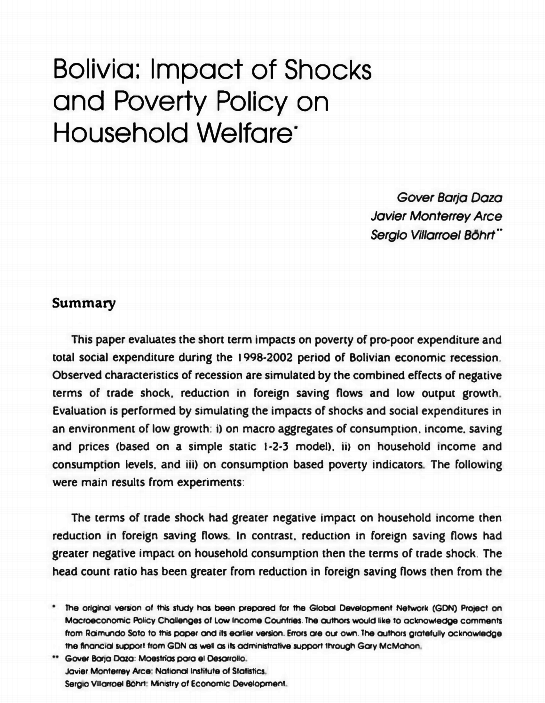Bolivia: Impact of Shocks and Poverty Policy on Household Welfare
DOI:
https://doi.org/10.35319/lajed.20066245Keywords:
Economic recession, Exchange, Macroeconomy, Pro-poor expenditureAbstract
This paper evaluates the short term impacts on poverty of pro-poor expenditure and total social expenditure during the 1998-2002 period of Bolivian economic recession. Observed characteristics of recession are simulated by the combined effects of negative terms of trade shock, reduction in foreign saving flows and low output growth. Evaluation is performed by simulating the impacts of shocks and social expenditures in an environment of low growth: i) on macro aggregates of consumption, income, saving and prices (based on a simple static 1-2-3 model), ii) on household income and consumption levels, and iii) on consumption based poverty indicators. The following were main results from experiments:
The terms of trade shock had greater negative impact on household income then reduction in foreign saving flows. In contrast, reduction in foreign saving flows had greater negative impact on household consumption then the terms of trade shock. The head count ratio has been greater from reduction in foreign saving flows then from the terms of trade shock. Poverty gap and poverty intensity has concentrated in rural areas, being greater from reduction in foreign saving flows then from the terms of trade shock.
The combined positive effects from observed social expenditure policy and effort in an environment of low output growth, did not compensate the combined negative impacts from the experienced terms of trade shock and reduction in foreign saving flows.
These conclusions show that under macroeconomic disequilibrium poverty reduction efforts become policies of poverty containment or safety net programs. Poverty reduction is a long term objective that requires long term commitment for an environment on macroeconomic stability.
Downloads
References
Andersen, Lykke. 2003. “Baja movilidad social en Bolivia: causas y consecuencias para el desarrollo”. Latin American Journal fo r Economic Development: No. 1, September 2003. IISEC, Universidad Católica Boliviana.
Barja, Gover. David McKenzie and Miguel Urquiola. 2004. “Capitalization and privatization in Bolivia: An approximation to an evaluation”. In: John Nellis y Nancy Birdsall (editors). Reality Check: Assessing the Distributional Impact of Privatization. Washington DC: The Center of Global Development Publisher. Forthcoming.
Barja, Gover and Miguel Urquiola. 2003. “Capitalization, regulation and the poor: access to basic services in Bolivia”. In: Catherine Waddams Price y Cecilia Ugaz (editors). Utility Privatization and Regulation: A fair deal for consumers? The World Institute for Development Economics Research. Edward Elgar Publishing. UK.
Barja, Gover. Javier Monterrey and Sergio Villarroel. 2003. “The elasticity of substitution in demand for non-tradables goods in Bolivia”. The Latin American and Caribbean Research Network, IADB.
Deaton, Angus and Zaidi Salman. 2002. “Guidelines for constructing consumption aggregates for welfare analysis. Living Standard Measurement Study”. Working paper N° 135. World Bank. Washington. U.S.A.
Deaton, Angus. 1997. “The analysis of household surveys: A microeconometric approach to development policy”. The johns Hopkins University Press. U.S.A.
Devarajan, Shantayanan and Delfin S. Go. 2002. “The 123PRSP Model”. In: Techniques and Tools for Evaluating the Poverty Impact o f Economic Policy, Chapter 13, World Bank.
Devarajan, Shantayanan, Jeffrey D. Lewis, and Sherman Robinson. 1990. “Policy Lessons From Two-sector Models”. Journal o f Policy Modeling. 12 (4): 625-657.
Devarajan, Shantayanan, Go Delfin S., Lewis Jeffrey D., Robinson Sherman and Sinko Pekka. 1997. “Simple General Equilibrium Modeling”. In Joseph François and Kenneth Reinert (eds), Applied Methods fo r Trade Policy Analysis: A Handbook Cambridge: Cambridge University Press.
Devarajan, Shantayanan, Jeffrey D. Lewis, and Sherman Robinson. 1993. “External Shocks, Purchasing Parity Power and The Equilibrium Real Exchange Rate”. World Bank Economic Review 7:45-63.
Engle, R.F. and C.W.J. Granger. 1987. “Cointerpretation and correction. Representation, estimation and testing”. Econometrica. 55, 251-276.
Foster James, Greer Joel and Thorbecke Erik. 1984. “A class of decomposable poverty measures”. Econometrica. Vol. 52. Issue 3. 761-766..
Garrón, Mauricio, Katherina Capra and Carlos Machicado. 2003. “Privatization in Bolivia: the impact of Firm performance”. The Latin American and Caribbean Research Network, IADB.
Hylleberg, S., R. F. Engle, C. W.J. Granger, and B.S. Yoo. 1990. “Seasonal Interpretation on Cointegration”. Journal of Econometrics. 44 (2), 215-238.
INE, UDAPE and World Bank. 2003. “Poverty and Inequity by Bolivian Municipal areas: Estimation of Consumption Expenditure by Combining the 2001 Census and Household Surveys”.
Jemio, Luis Carlos and Manfred Wiebelt. 2001. “¿Existe espacio para políticas antishocks en Bolivia?” Latin American Journal of Economic Development: N° 1, September 2003. IISEC, Universidad Católica Boliviana.
Lanjouw, Jean Oison and Lanjouw Peter. 1997. “Poverty Comparisons with noncompatible data”. Policy Research Working Paper 1709. World Bank. Washington.
Medina, Fernando. 2002. “Equivalence Scales: A brief review of concepts and methods”. Economic Commission for Latin America and the Caribbean. Third Meeting of the Expert Group on Poverty Statistics (Rio Group). Lisbon. Republic of Bolivia. 2001. “Poverty Reduction Strategy Paper” (PRSP).
Republic of Bolivia. INE and United Nations. 2003. “Bolivia: Social and Demographic Characteristic of Indigenous People”. Republic of Bolivia.
Republic of Bolivia. Unidad de Análisis de Políticas Sociales y Económicas 2003. “Estrategia Boliviana de Reducción de la Pobreza: Informe de Avance y Perspectivas”.
Sen, Amartya. 1976. “Poverty an ordinal approach to measurement”. Econometr ica. Vol. 44. Issue 2. pages 219 - 231.
Spatz, Julius. 2003. “The impact of structural reform on wages and employment: the case of formal versus informal workers in Bolivia”. Latin American Journal of Economic Development. N°.2, April 2004. IISEC, Universidad Católica Boliviana.
Steward, Frances. 2003. “The implications for chronic poverty of alternative approaches to conceptualizing poverty”. Department of Financial International Development (DFID). England.
Thiele, Rainier and Manfred Wiebelt. 2003. “Attacking poverty in Bolivia. Past evidence and future prospects: Lessons from a CGE analysis”. Working Paper 6/2003, IISEC, Universidad Católica Boliviana.
World Bank. 2003. Poverty Manual. Washington. U.S.A.






